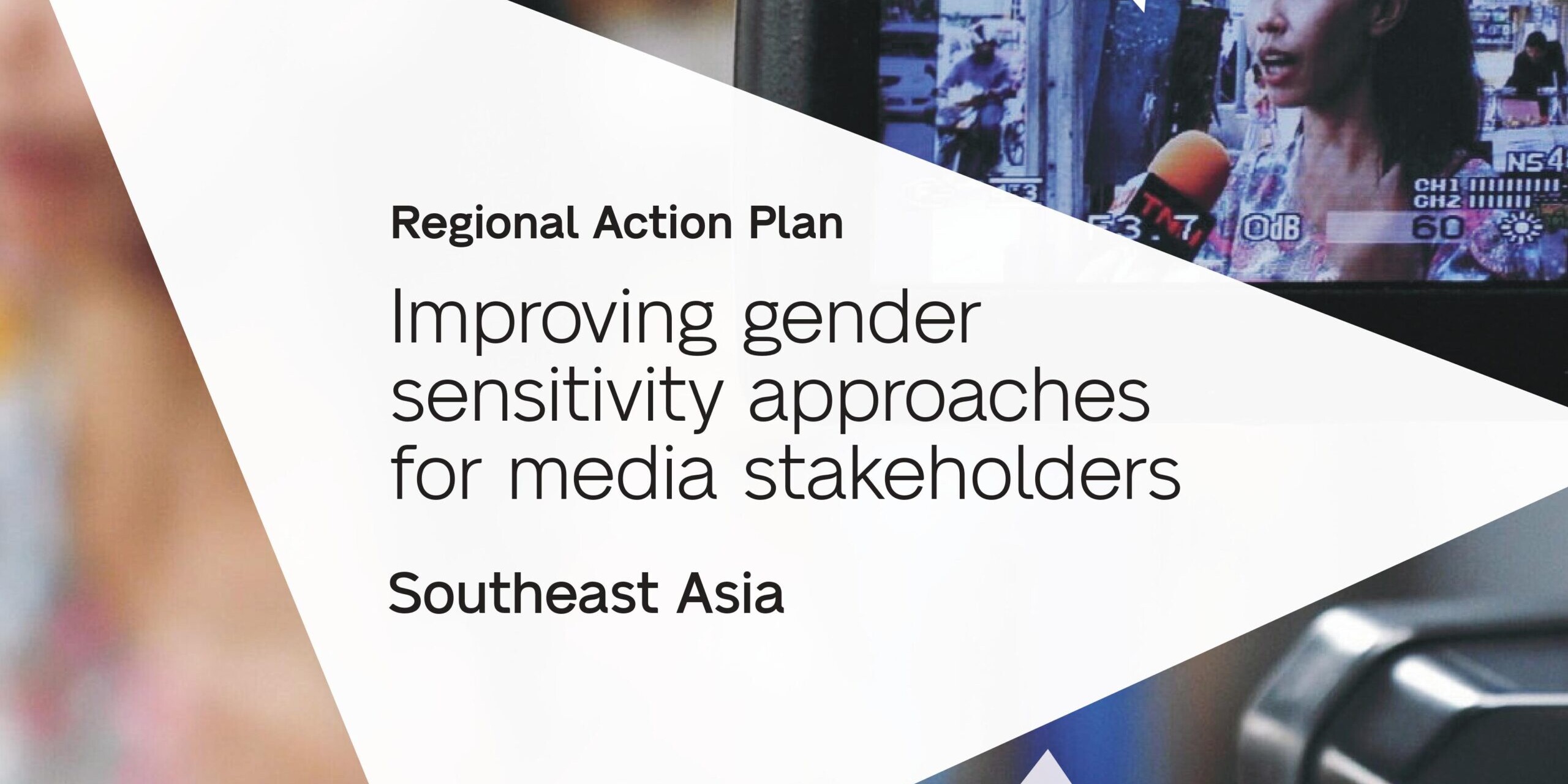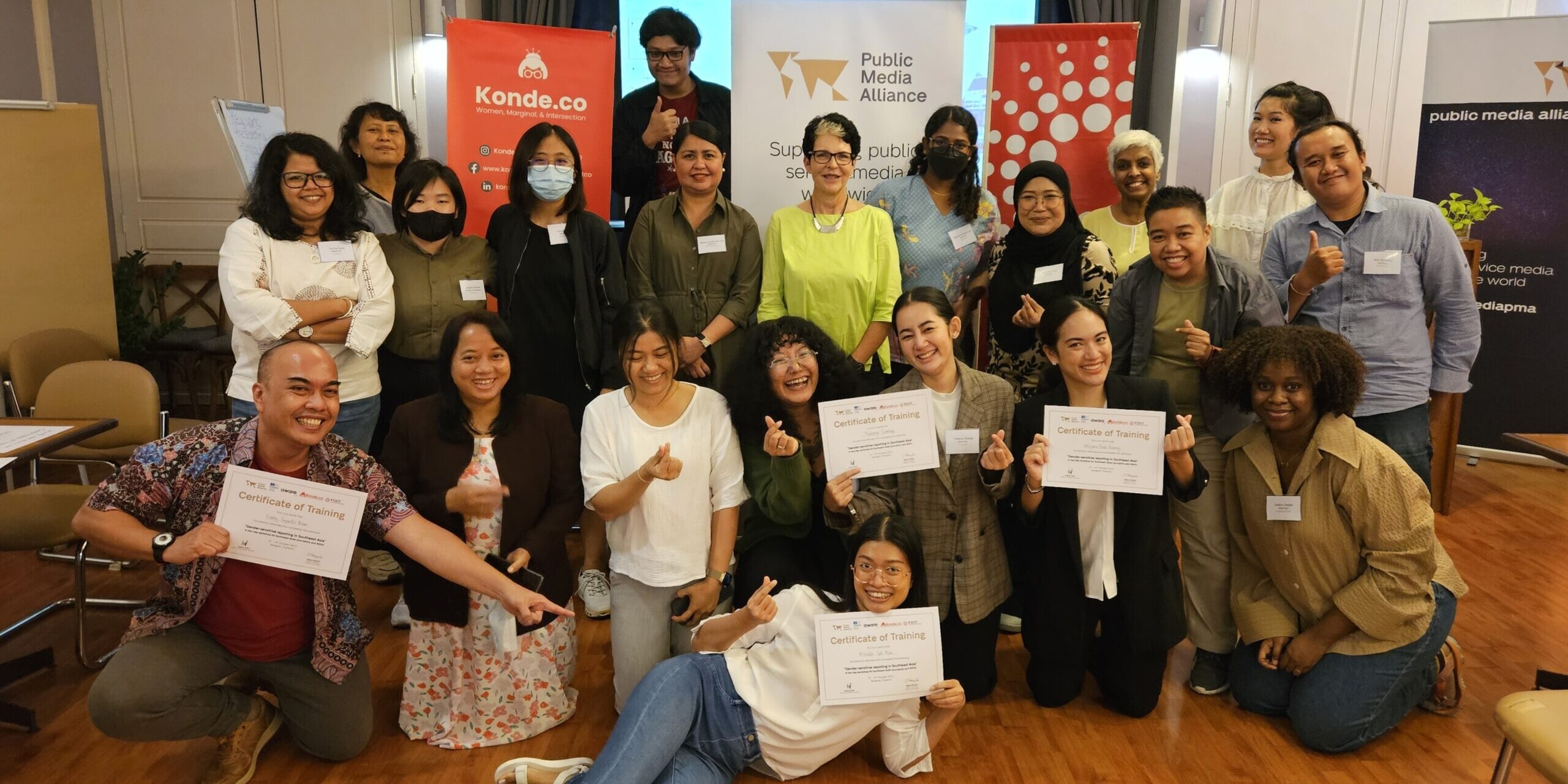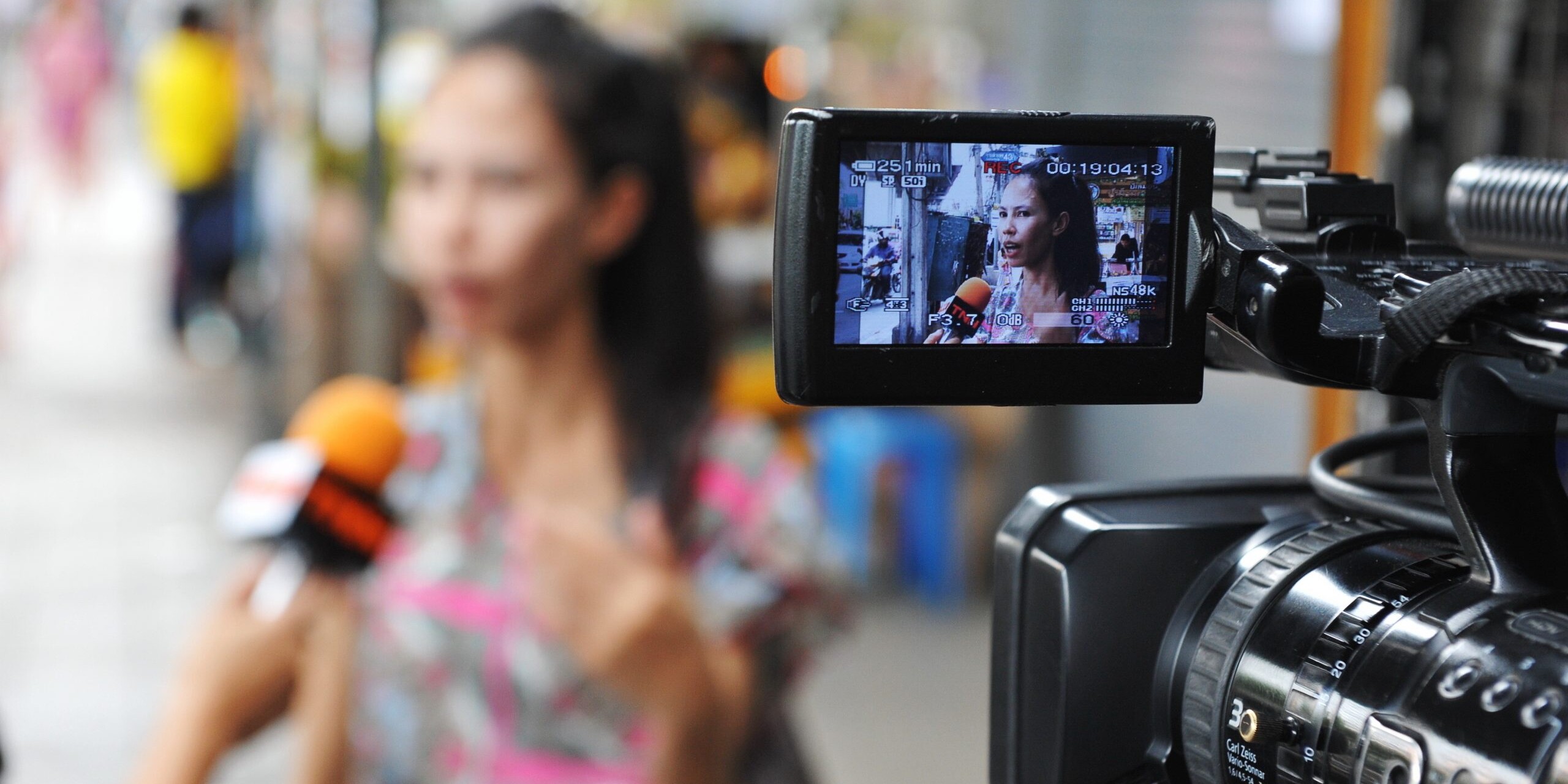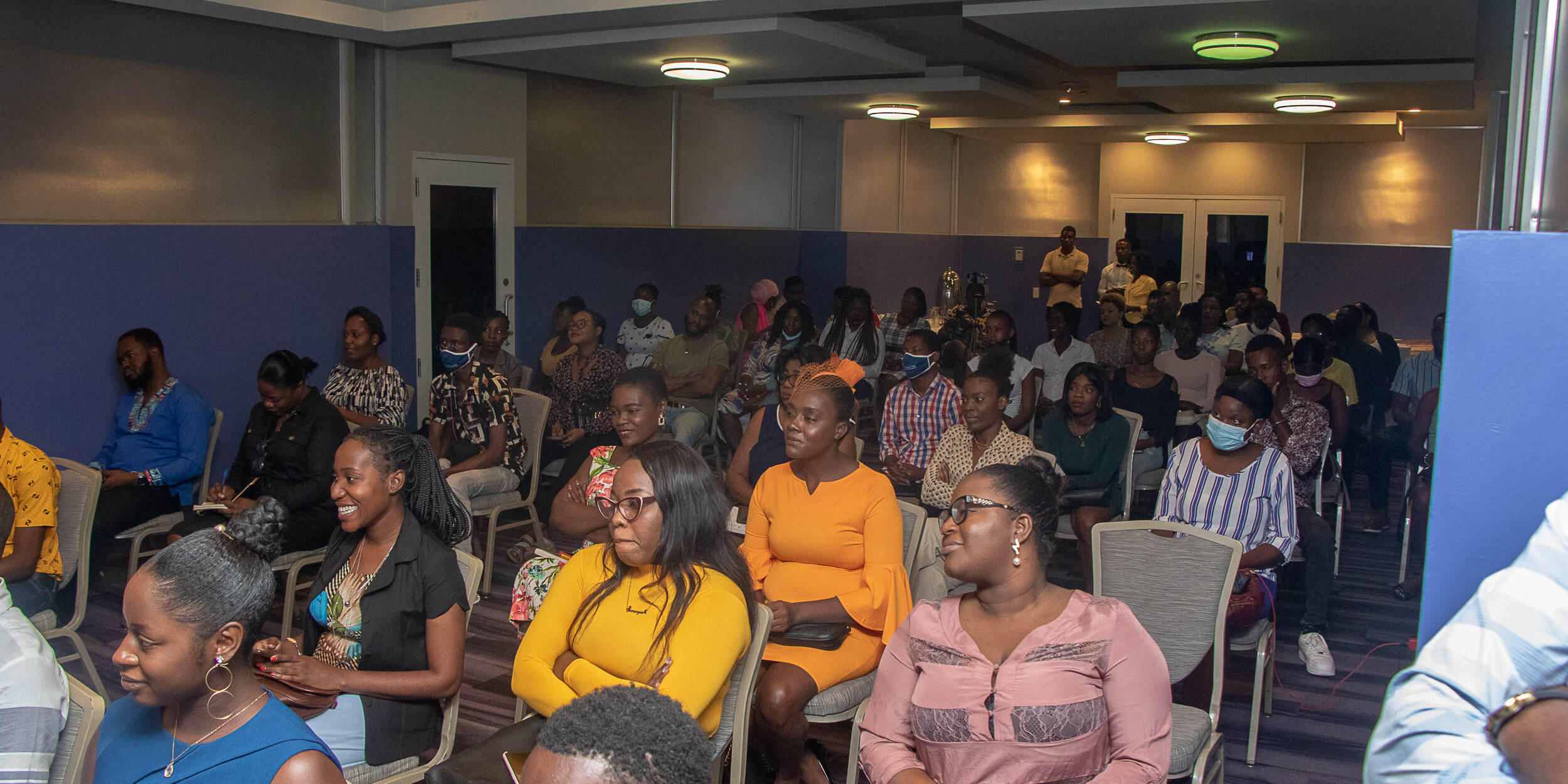Project
What?
The project aims to create an ongoing collaboration between gender-focused CSOs/NGOs and media institutions in five Southeast Asian countries: Indonesia, Philippines, Malaysia, Singapore, and Thailand. The project aims to enable CSOs/NGOs and the media to work collaboratively together to produce more transparent, relevant, responsive, and accessible content on gender issues, especially addressing Violence against women and girls (VAWG).
The project will culminate in the production of country-specific action plans, developed with input from participating broadcasters and CSOs/NGOs.
Key project activities include:
- Regional situation report on five countries specifically about how greater media participation can help to bring about changes in social attitudes and gender equity with a focus on violence against women and girls (VAWG)
- Two-day capacity building workshop in Bangkok for gender-focused NGOs and media makers to raise awareness and develop skills on how to combat gender discrimination and gender-based censorship within the media and develop regional action plans
- Two webinars to discuss project objectives and the resulting situation report and action plans
Why?
Violence against women is leading to global systemic inequalities. In recent years, there have been some initiatives by women’s groups and media professionals to address the lack of research and guidelines regarding coverage of women in the media and women’s issues. These efforts have started to pave the way for open discussions on the issue of gender-sensitive media coverage, particularly on issues such as violence against women.
The media plays a central role in forming and disseminating perceptions of gender. This project aims to reduce gender stereotyping and bring about gender equality and changes in social attitudes through positive media content, enabling greater media participation by women, recognising and reflecting on the role and potential of women in the media, and facilitating and developing a closer working relationship between the mainstream media sector and those working to empower women by giving them a voice.
All sectors, including the media sector, need to take the necessary action in the context of a multi-sectoral approach to challenge violence against women and change cultural attitudes towards gender norms.
When?
This project will run from March to November 2023.
Latest updates
OUT NOW | PMA’s gender-sensitive action plans for SEA media stakeholders
7th December 2023
Action plans designed to boost gender-sensitive reporting and foster collaborations between media houses and NGOs have been unveiled by PMA.
The highlights of our gender-sensitive reporting workshop for SEA journalists and NGOs
20th October 2023
The Public Media Alliance recently hosted its gender-sensitive reporting workshop in Bangkok. Here are the highlights from the two-day event.
Applications open for two-day gender sensitive reporting workshop in Bangkok
30th June 2023
Registration is now open for our gender-sensitive reporting workshop for journalists and NGOs from Southeast Asia.
PMA announces major projects for 2023
21st February 2023
Here's a look at PMA's 2023 slate of projects — ranging from digital journalism, gender reporting, and sustainability!
Project reports
Situation Report: Gender-sensitive reporting in Southeast Asia
2023
The Public Media Alliance’s latest situation report — this time for Southeast Asia — will guide tailored interventions for each target country, catalysing regional collaboration and aligning regional efforts with broader international goals.
The media situation report covers five Southeast Asian countries – Indonesia, Malaysia, the Philippines, Singapore, and Thailand – and forms part of the efforts to better understand just how the media can both support and undertake initiatives that improve gender representation and alleviate violence against women and girls, and violence against women journalists.
The report provides a snapshot of the current situation facing the Southeast Asian media on gender issues and considers how the media can do better. In each country, research was undertaken over a period of six months. Separately, a survey was conducted with regional journalists to determine gaps that exist within newsrooms to more effectively handle gender-related issues.
Key findings include:
- The interconnectivity of the issues: While each country presented unique challenges – from poor adherence and existing policies to politically motivated attacks on journalists – there were significant overlaps between the issues.
- The need for collaboration: Each researcher determined that collaboration among stakeholders was paramount for success, especially regarding the intricate interplay of media and gender issues.
- The need for further research: Researchers noted that extensive and comprehensive research and data on gender representation in the media, violence against women and girls and female journalists, is lacking in the Southeast Asian context.
- The need for wider social change: The researchers noted that achieving meaningful progress requires wider social change across the five countries.
Download the situation report:
Action Plan: Improving gender-sensitivity approaches for Southeast Asian media stakeholders
2023
In October 2023, 20 media workers and representatives from gender-focused non-governmental organisations (NGOs) from five Southeast Asian countries attended a two-day workshop in Bangkok, Thailand to develop country-specific action plans that would contribute towards more effective and gender-sensitive reporting.
The Public Media Alliance’s new action plans outline approaches that foster collaboration and address common challenges related to gender-sensitive reporting, women’s safety, and responsible media practices across the diverse media landscapes of Southeast Asia. The plans offer collective initiatives for media workers, NGOs, policymakers, religious institutions, and the broader public to undertake in Indonesia, Malaysia, Singapore, Thailand, and the Philippines.
Among the common action points highlighted in the plans are:
- The need to build engagement and collaborations
- Advocacy for gender-responsive policies and guidelines
- The need to establish data collection and reporting systems
- The importance of intersectional approaches to gender issues
- The implementation of newsroom safety protocols and support for women journalists
The plans have been translated into Indonesian, Malay, Filipino, Mandarin, Tamil, and Thai. An English version encompassing all countries is also available.
The action plans form part of a wider project spearheaded by the Public Media Alliance with support from the UNESCO Bangkok Office and UNESCO’s International Programme for the Development of Communication (IPDC), and in partnership with AWARE Singapore, Konde.co, and the Foreign Correspondents’ Club of Thailand. Special thanks go to our workshop participants who contributed towards the development of the action plans, and our project facilitator Dagmar Skopalik.
Download the Regional Action Plan:
Download the Country-Specific Action Plans:
Project partners
The action plans and situation report form part of a wider project spearheaded by the Public Media Alliance with support from the UNESCO Bangkok Office and UNESCO’s International Programme for the Development of Communication (IPDC), and in partnership with AWARE Singapore, Konde.co, and the Foreign Correspondents’ Club of Thailand. Special thanks go to our workshop participants who contributed towards the development of the action plans, and our project facilitator Dagmar Skopalik.

Featured image: A bystander gives an interview to news media after a nail bomb blast on May 27, 2013 in Bangkok, Thailand. Credit: 1000 Words / Shutterstock.com
Secondary image: Participants and facilitators at the conclusion of PMA’s gender-sensitive reporting workshop for Southeast Asian media workers and NGOs, Bangkok, 4 October 2023. Credit: PMA



